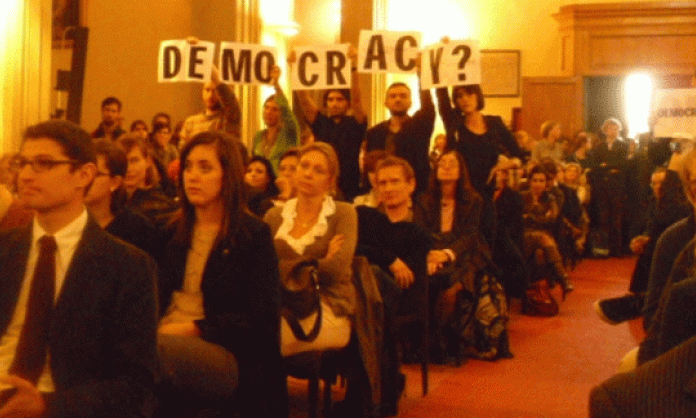Nearly 200 people attended an important meeting at Sydney University to oppose an attack on free speech and intellectual freedom by campus administrators. Called by a coalition of left wing activists, trade unionists and students, the 29 April meeting was organised as part of the campaign to defend NTEU member and director of the Centre for Peace and Conflict Studies, associate professor Jake Lynch.
Lynch and a number of student protesters are being targeted by the university for their actions during a public lecture delivered in March by Richard Kemp, a retired British army colonel. Kemp has made his name, in part, as a defender of Israeli war crimes.
After students interrupted his lecture with chants about Kemp’s support for genocide, security guards violently intervened to remove them from the theatre. Lynch, who was not initially part of the protest, sought to defend the students’ right to oppose Kemp vocally and was himself then assaulted by a member of the audience.
The university responded to the events by publicly associating Lynch with accusations of anti-Semitism and initiating a disciplinary process against him and some of the students present. The university has now admitted there is no substance to the claim of anti-Semitism but has refused to make this widely known. Instead, it has been left to the union to try to clear this slander by announcing the university’s admission.
A dubious investigation conducted by pro-employer law firm Workdynamic Australia continues. Workdynamic enjoys a close and no doubt lucrative relationship with the university, which last year made job offers to its two directors, according to a profile in the Australian Financial Review.
The Workdynamic investigation is focused on whether Lynch and the students breached the university’s codes of conduct. From the beginning, the investigation has reeked of political bias. It is clear that the university is determined to punish anyone whose opinion conflicts with its corporate agenda and pro-Israel backers.
Should the investigation conclude that the accused are guilty of misconduct under one of the university’s codes, Lynch could be sacked and the students expelled or suspended.
The recent meeting of supporters – including many who are members of the NTEU – called on the university to drop all the charges. However, those who addressed the crowd and people speaking from the floor expressed little faith in the neutrality of the university’s investigation.
Union members recognise the serious implications of the case. If the university can employ its various codes of conduct to persecute staff and students who disagree with university policy, the scope for the expression of opinion on campus narrows drastically. A successful attack on Lynch in these circumstances would establish a dangerous precedent for political freedoms at the university.
The recent meeting was an excellent development in the campaign. It was full of people wanting to fight. Even union members who had previously voted against the NTEU adopting a position in support of BDS came to show solidarity with those now facing management’s attacks.
It is expected the results of Workdynamic’s investigation will be made public within weeks. The campaign to defend Lynch and the targeted students will continue until the university relents.
----------
Alma Torlakovic is the NTEU branch committee member for Sydney University.










